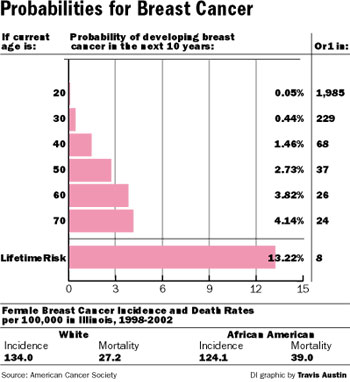Lotto ticket funds cancer research

Travis Austin
Jan 18, 2006
Last updated on May 12, 2016 at 12:27 a.m.
Since the creation of the Illinois Lottery in 1974, all profits have been put into the State Common School Fund. However, on Jan. 9, Illinois introduced “Ticket for the Cure,” the nation’s first lottery ticket raising money for breast cancer research.
According to the Illinois Lottery’s Web site, Illinois students and schools receive almost $600 million from revenue each year. Last year, the proceeds from the lotto reached a record high of $614 million.
The proceeds produced through the “Ticket for the Cure,” however, will help fund breast cancer education, research, early detection and patient services throughout Illinois.
“I think it’s a great idea that the funds be reallocated to another organization like the breast cancer awareness fund since it is a significant killer of women,” said Alicia Aguirre, sophomore in LAS.
Get The Daily Illini in your inbox!
While there has been speculation of the new ticket affecting other ticket sales, therefore lowering the profits of the State Common School Fund, officials feel there is nothing to worry about.
“We are confident that (the “Ticket for the Cure”) will not defer from the educational proceeds,” said Mia Sissac, spokesperson for the Illinois lottery. “The school fund profits have been continually increasing over the past years.”
In addition, the necessary measures have been taken to make sure there is enough money to go around.
“The lowering of educational profit won’t happen, according to our Department of Revenue,” said Gerardo Cardenas, spokesperson for Gov. Rod Blagojevich. “Our net revenue shows that we will be able to pay off the $20,000 prize without affecting the education funds.”
The “Ticket for the Cure” may also attract new players.
“More players will be introduced to the game,” Sissac said. “That way, they will be able to see how much fun it is and become regulars.”
Breast cancer is the second leading cause of cancer deaths in women, next to lung cancer, and is the most common cancer among women. The American Cancer Society predicts that 9,000 women in Illinois will be diagnosed with breast cancer in 2006.
“New research shows that women seem to be getting breast cancer earlier than they used to,” Cardenas said. “A large number of state officials and others are very concerned by this. Therefore the government is taking a number of steps beyond this legislation.”
Senate President Emil Jones, as a way to address the health disparity, introduced the “Ticket for the Cure.” Since he was unable to sponsor the idea, he suggested it to Sen. Mattie Hunter, who took the initiative.
In July 2005, Blagojevich signed the legislation, making the “Ticket For The Cure” official.
“This new ticket will bring attention to a major issue that people have not talked about before,” Sassic said. “It’s a gateway to bring attention to a larger social issue.”
While Illinois is the first state in the nation to develop a lottery ticket that supports breast cancer, Canada was the first to come up with the idea. The Canadian Cancer Society Lottery, created in 1938, funds research on all types of cancer, provides valuable information to its citizens and offers support to those with cancer and their families.
“I think it will spread because there are also many other organizations that support great causes that will look for other way of acquiring funds and this is a great way to provide those funds to needy organizations,” said Aguirre.
The “Ticket for the Cure” costs $2 and has a top prize of $20,000. Each ticket has ten chances to win, with ten separate prizes. If a gambler scratches to find a “$$” sign, he/she collects all ten of the prizes.
Tickets are available at Illinois Lottery retail locations across the state.





